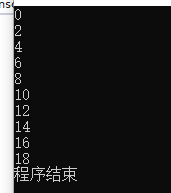C++CLI——4数组、泛型、集合与属性
C++数组
在c++中,数组的大小必须在编译时确定,并且将数组传递给函数时,传递的只是数组起始地址,所以要想办法连同数组大小一同传递给函数。
int arr[4] = { 1,2,3,4 };
int arr1[] = { 1,2,3,4 };
int arr2[2][3] //多维数组
动态创建数组
C++中直接声明数组需要明确数组的大小,但是可以使用new来动态创建数组,虽然这样数组也有固定的大小,只是在运行期间可以确定需要多少元素后再创建制定大小数组。
int* pa = new int[size];//size为运行时确定
delete [] pa;//不用时要释放
C++/CLI泛型
C#中具有泛型类型,C++/CLI中也具有泛型类型。
generic <typename T>
ref class Mylist
{
public:void Add(T obj);T GetAtIndex(int idx);
};//使用时制定泛型类型
Mylist<String^>^ lists = gcnew Mylist<String^>();
C++中的泛型模板和.net中的泛型虽然功能很相似,但是工作方式完全不同,所以在C++/CLR中都得到了支持。两者主要的不同之处有:
- 模版是在编译时就实例化好的,而泛型是在运行时仍然是泛型的;
- 模版支持特化、非类型模板参数和模版参数等,而泛型不支持,要简单的多;
- 泛型类型不能从类型参数继承,而模板可以;
- 泛型不支持元编程;
- 泛型类型支持类型参数约束,模板不支持。
托管数组
与C++不同,托管数组直接分配到堆上,首gc的管理,而且索引不再制定从某个地址偏移。并且要用Array关键字来声明。
array<int>^ arr1;
array<IntVal^, 2>^ arr2;//2维数组
//初始化
array<int>^ arr1 = gcnew array<int>(3) { 1, 2, 3 };
array<int>^ arr2 = gcnew array<int> {1, 2, 3};
array<int>^ arr3 = {1,2,3};
对于引用类型的数组,实际上是句柄的数组。例如main函数int main(array<System::String^>^ args),实际上是String的句柄数组。另外.net提供了for each循环来遍历数组,与C#一样任何实现了IEnumberator接口的集合都可以使用for each
array<int>^ arr3 = {1,2,3};for each (int s in arr3)
{Console::WriteLine(s);
}
多维数组
与C++不同,多维数组的维数要在尖括号中定义,且读取多维数组也要在一个方括号中添加索引。
array<int, 2>^ array2d = gcnew array<int, 2>(3, 3);
array2d[1, 2] = 3;
array<int, 2>^ array2d_1 = {{1,2,3},{4,5,6},{7,8,9}
};Console::WriteLine(array2d_1[0,1]);
List<T>
在实际开发过程中,更多的使用泛型集合类,因为集合可以改变大小。
using namespace System::Collections::Generic;List<int>^ lst = gcnew List<int>();
lst->Add(0);
lst->Add(1);
lst->Add(2);
List<int>^ lst = gcnew List<int>(10);//指定容量SortedList<String^, int>^ sl = gcnew SortedList<String^, int>();
sl->Add("a", 1044);
STL/CLR
STL容器是标准C++一部分,提供了一系列高性能、可扩展的集合类。C++/CLi提供了托管STL版本。使用方法与STL类似。
#include <cliext/vector>
using namespace System;
using namespace cliext;int main(array<System::String^>^ args)
{vector<double> v1;for (int i = 0; i < 10; i++){v1.push_back(i * 2);}for (vector<double>::iterator it = v1.begin();it!=v1.end(); it++){Console::WriteLine(*it);}Console::WriteLine("程序结束");
}

属性
在.net中一般不会公开字段,而是公开属性。属性本身就是方法包含get和set。在C++/CLI中支持两种属性,标准量属性和索引属性。
标量属性
标量属性也就是最常见的属性,将私有字段使用属性保护起来,使用property来声明,而且可以根据需要只实现get以满足只读属性的要求。
ref class Person
{
public:property String^ Name{String^ get(){return name;}void set(String^ value){name = value;}}property int Age{int get(){return age;}void set(int value){age = value;}}
private:String^ name;int age;
};int main(array<System::String^>^ args)
{Person^ p = gcnew Person();p->Name = "小明";p->Age = 10;Console::WriteLine("{0}今年{1}岁", p->Name, p->Age);Console::WriteLine("程序结束");
}

自动属性
在C#中是可以自动实现属性的如public int Order { set; get; } ,C++/CLI中同样可以:property String^ Name。
属性继承
因为属性本质上就是方法,所以可以实现虚属性,以达到重写属性的目的。
public ref class Shape abstract
{
public:virtual property double Area;
};public ref class Circle:Shape
{
private:double r=1;
public:virtual property double Area {double get() override {return Math::PI * r * r;}}
};
属性索引
属性索引就是可以在对象上直接使用[]来访问,其工作方式与标量属性相似,只需要在属性名后面的方括中包含索引类型就可以
property double Name[int],这段代码定义的索引属性为Name,其索引类型为long,在get和set函数中的第一个参数必须为索引。
property double Name[int]
{double get(int idx){...}void set(int idx,double vlaue){...}
}double bal = a1->Name[10];//使用
如果使用defaut名称,可以在对象上直接访问
ref class Account
{
private:List<int>^ lst = gcnew List<int>();
public:Account(){lst->Add(1);lst->Add(2);lst->Add(3);lst->Add(4);lst->Add(5);lst->Add(6);}property int Value[int]{int get(int idx){return lst[idx];}}//使用default可以在对象上直接访问property int default[int]{int get(int idx){return lst[idx];}}
};int main(array<System::String^>^ args)
{Account^ a = gcnew Account();int s = a->Value[0];int ss = a[1];//使用default可以在对象上直接访问Console::WriteLine(s);Console::WriteLine(ss);Console::WriteLine("程序结束");
}











- 轮转数组)
)


![【JAVA GUI+MYSQL]社团信息管理系统](http://pic.xiahunao.cn/【JAVA GUI+MYSQL]社团信息管理系统)




